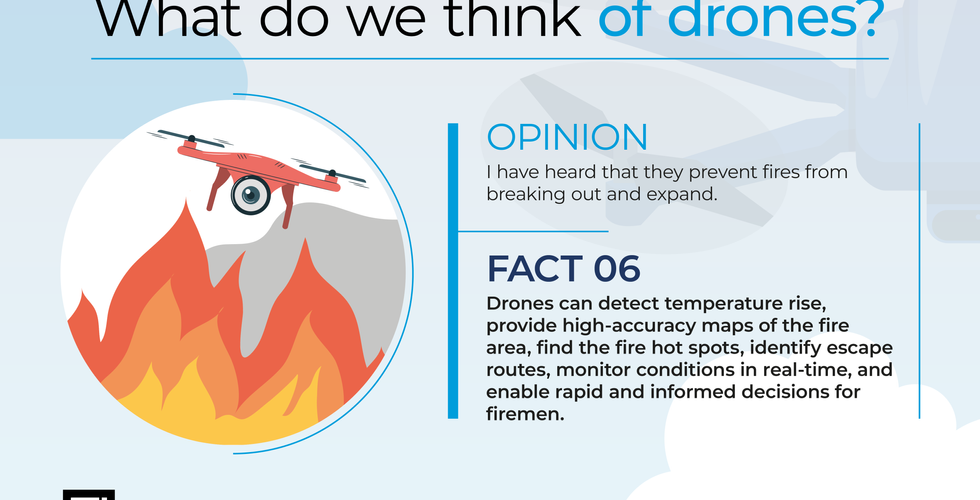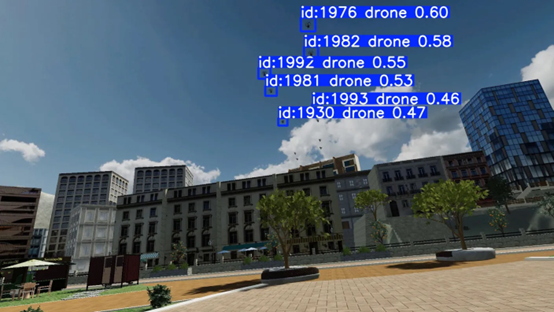Social acceptance of drones | Part B
- ImAFUSA

- Apr 24, 2024
- 6 min read
Updated: Jul 3, 2024
What do people think about drones after all?
In the 1st article of this blog series, we read about the contribution of UAVs (drones) to society in various sectors, from medical deliveries and emergency interventions to firefighting and intra-city travel. But we cannot stop but wonder; Is society collectively aware of the positive aspects of these novel airborne "visitors"? Or do people believe that drones are only good for wedding videography and touristic photos? Are they intrusive and act as a “Big Brother” above our heads monitoring our moves or do they protect us from the bad guys out there? Is the noise produced all too much or is it just another annoyance covered by our big cities’ hustle and bustle?

In our project, ImAFUSA, we've been endeavoring to understand this widespread sentiment by conducting interviews and gauging the pulse of public opinion. Read in a blog post some conclusions we drew from the interviews we conducted during the project’s test flights in Egaleo City, in Athens, Greece in February 2024. We should note that these isolated cases may not represent the whole of society but they offer us a first approach to the matter and they provide very interesting insights into what people believe in reality. They were mainly students and people who were strolling in the park along with their kids.

What about legislation?
The most important factor related to social acceptance of drones seems to be the issue of privacy and personal data. Most of our interviewees summarise their thoughts in a few words, “Who is going to use it and for what reason?”. Eleni, a student from the National Polytechnic University of Athens (NTUA) says, “What kind of legislation will be used to determine the flying areas and the purpose of flying?” Adonis, a citizen of Egaleo and an employee adds, “I don't know what legal framework exists. For me, this is the biggest issue, the legislation and of course their use… I am negative if a drone carries cameras and records our moves. Since it is a new thing, it needs attention; who will use it, and for what reason? There should be a complete legal framework and people should be informed and give their consent first.” Giorgos, another student of NTUA, sets the focus on peoples’ concerns. “Another issue is the recording. Even though we all carry devices that constantly record us, mobile phones, many will consider that a drone flying above them is not only to carry an object or help firefighting but to record them with a camera as it is already done in many countries with malicious intent”, he says. On the contrary, there are people who put the safety aspect on top, surpassing any other concerns. Like Stella, a citizen of Egaleo and mum of two, who says, “I am very positive. I don't care about privacy issues at all, if you don't have anything to hide, you're ok and you should not be adverse to them. Since security issues are also covered – as drones know where you are each time and can help you in case of emergency – it will be even better!”
I am particularly concerned about the noise because we already have noise pollution in our city…imagine that we are now next to a main road and I can still hear it [the drone]
People's main thoughts on drones (created by Future Needs)
Is it that noisy?
In a busy city like Athens, where the test flights of the project took place, it is perhaps rather strange to ask people if they are bothered by drones’ noise while they are used to very high noise pollution in their daily lives. “Regarding noise, in general, in Athens, there is already a lot of noise from cars…on the other hand, if there was a way to make drones quieter, I would see them in a more positive light”, Eleni notes. On the other hand, Adonis states that even in front of a busy Athenian road, the drone is still a buzz. “I am particularly concerned about the noise because we already have noise pollution in our city…imagine that we are now next to a main road and I can still hear it [the drone]”, he says.
Is it only for wedding videography?
The general sentiment from all the people we talked to is that society as a whole is not aware of the potential of drones and still believes that they are mostly mini cameras flying above. “The truth is that because drones have been developed only in the last 15 years, the younger generations know they exist, but I am not sure how many of them are aware of their extensive uses. The older generations, due to their lack of technological matters, are not aware of their uses, they may think it's mainly for making videos (as many youngsters believe so)….the younger ones, those who engage more with drones, will learn all the applications, whereas those who don't engage, will continue to think it's just for making videos”, says Giorgos. An employee in the Egaleo Municipality, Giannis, suggests that there should be some kind of awareness campaign. He adds, “As a Municipality, we have run the "First Respond" project, where we showed how the first action of a drone should be organised in an emergency case, how it can arrange the intervention of the rescuers, the means of rescue, etc., and we promoted it through social media”. Giorgos has the same idea and adds that maybe something bad has to happen so citizens can understand how a drone can help society. “For example, in the case of a fire, where someone watches on the news that a drone throws water or manages to measure air temperature by signalling the fire brigade, and thus realise that the drone acted preemptively, only then will they change their mind about them. There must be an action, a campaign to inform people and not wait for the bad thing to happen to convince them”, he notes.
The potential
The uses of drones are many, especially in the case of a Municipality, the police, and the fire department. As a Municipality employee, Vasilis said, “At the Municipality, and city level, they give us useful information about the situation of our city. In case of an emergency, we fly the drone and see what happens. It facilitates our needs as a Municipality. Until now, we have digitised the area of the Municipality (mapping), and in an emergency, a fire, or an accident, the Municipal Police can use a drone. This has probably not been done yet, but there is the infrastructure in our Municipality to do so. Perhaps drones can also transport objects in emergencies, fires, floods, etc”.
They can be very useful but if not used properly, drones can become dangerous. If the drone can't withstand rain or strong winds, then it can fall and hit someone
Future concerns
In the future, in a multi-drone setting, concerns are quite high. According to Vasilis, the main issue is the potential ignorance of users, because “everyone would like to fly one for their needs, and they may not have the knowledge”. He is also concerned about the safety issues of a drone, battery charging, or handling errors, and that is why “there should be proper education, legislation, etc.” Additionally, Giannis focused on air mobility issues, as the air traffic trajectories, thus “if one drone hits another, the matter of control, whether one drone will be able to ‘see’ the other, as is done with airplanes”. Giorgos focuses more on the weather changes and the capacity of a drone to adapt, saying that “they can be very useful but if not used properly, drones can become dangerous. For example, in a country with a temperate climate, where one day it rains and the other day the weather is better, a drone should be expected to be able to withstand the sudden weather changes, because as we see here today, it is sunny in the morning and then it is raining. If the drone can't withstand rain or strong winds, then it can fall and hit someone”.

Conclusion
Can we actually draw some first conclusions? Well, yes! Yes, it seems that people in general are positive about this new technology. Yes, they know or suspect the potential of drones in one way or another. On the other hand, though, they are quite skeptical about legislation, users’ know-how, the dangers of a multi-drone urban air scenery, and personal data violation. And, finally, most of them agree that people have to learn more and get acquainted with flying vehicles. And here is where comes the role of local authorities, national governments, and the European Union, to pave the way to a wider social acceptance, with the implementation of projects and initiatives like the ImaFUSA project and other similar ones under the same Call.
You can stay updated on the upcoming official flights by following our social media and checking the news section on the project’s website.


























